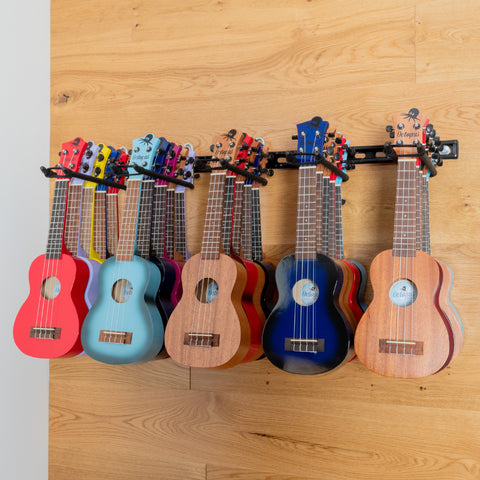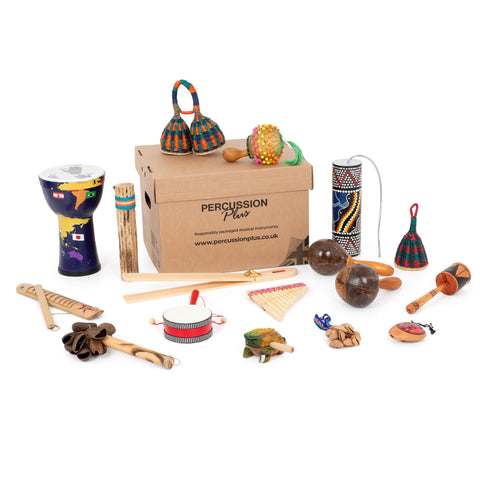It won’t surprise you that most of us at Chamberlain Music are musicians who started learning from a young age, and we’re proud to say a good number of us even went on to study music at university or conservatoire. So naturally, recent reports of a decline in the status of music education in schools are concerning to read.[1][2]
Many studies have demonstrated that benefits of learning music from a young age are evident in various aspects of a student’s personal development, providing an array of strong arguments for a focused and well-resourced approach to music education. This article will outline some of these benefits, as well as discussing the challenges faced by teachers attempting to deliver effective music education to young students.
What are the wider benefits of music education?
Some of the benefits of learning music are obvious enough (at least we think so!). Learning to make music is not only a fun creative endeavour; it provides something totally different to most other lessons in school. Less copying down from textbooks, more diverse forms of creation. Less sitting around repeating the same sums, more intricate physical activity. Being encouraged to make your own creative sounds, rather than be silent.
Studies have shown that learning music can help improve children’s fine motor skills, which in turn benefits their typing, writing and drawing.[3][4] Research has also suggested an impressive link between learning music and increased perseverance. A study by Laurie Scott (1992) shows that music lessons - specifically in the Suzuki method for violin - were better at stimulating perseverance than other types of creative endeavour, teaching children about the wonders of delayed gratification! After all, patience is a virtue.
These kinds of positives are perhaps unsurprising, but scholars from various fields have suggested some less intuitive ones as well:
Enhancing vocabulary: Children exposed to a multi-year programme of music tuition involving training improved faster at reading compared with their non-musically trained peers, according to a study published in the journal Psychology of Music.[5] Don’t be shocked if the musical students are the same ones flying through Harry Potter at breakneck speed too!
Read the full study | Read the Science Daily summary.
Improving Anxiety Management: A 2014 study suggests that playing a musical instrument as a child is associated with more rapid cortical thickness maturation within areas of the brain that regulate our emotional and impulsive response. Music is a brilliant creative outlet, which might be a lot more appealing to children who struggle with more ‘boring’ (sorry!) subjects like Maths, English or even the dreaded Biology.
Boosting maths achievement – Speaking (more positively) of maths, its correlation with music is very strong. After all, both disciplines are pattern based, involve lots of symbols and numbers. Studies including James Catherall’s from 1998, have shown positive correlations between music involvement and better maths achievement. Who knows, learning music might even convince some of the more hesitant children that Maths actually IS fun and important!
Read the full study | Read summary by ArtsEdSearch
Feversham Primary Academy in Bradford have even seen remarkable improvements in academics and wellbeing across the board spawning from a heightened focus on music, as detailed in this Guardian article.
This is by no means an exhaustive list, but there are some helpful research compilations available such as:
Music Matters – special report by Arts Education Partnership, a national network of more than 200 organizations dedicated to advancing arts education in the US. (2018)
17 evidence-based benefits of music education – a list of music education research compiled by Natalie Grant, a veteran primary school teacher and classically trained oboist. (2020)
With any study pointing to the positive effects of learning music, there are some potential caveats and biases to be aware of:
Financial: children from families who can afford to pay for music tuition/instruments/sheet music are more likely to also have access to some form of private tuition that might improve their overall academic achievement. Usually, studies will be carried out in such a way as to eliminate or factor in this kind of bias.
Aptitude: intuitively, children with more aptitude for general studying are somewhat more likely to have more aptitude for learning an instrument. Hence, they may be more likely to continue learning the instrument for longer, consolidating this bias.
Critical: These studies are often carried out by musicologists, or other scholars with an interest in music. Even when studies are carried out with objective integrity in mind, the small possibility of a subconscious pro-music bias should not be ignored.
Why is teaching music so different to other subjects?
A common theme in studies about music education, particularly in primary schools, is the idea that teaching music is very different to other subjects, and indeed more difficult. This is particularly evident in primary schools, where non-specialist music teachers are often tasked with taking music lessons.
Most primary teachers are generalist teachers; they are accustomed to turning their able hand to a variety of subjects which they have not specialised in. Their expertise and understanding of how children learn best, along with study of dedicated, course-specific materials would usually be sufficient.
However, it seems that music presents particular problems, more so than other subjects. These include:
Heightened anxiety: Even seasoned pro musicians can get anxious about any performance, so it’s only natural that having to demonstrate music to a class is stressful.
These anxieties include being unable to demonstrate ‘good practice’, to being unable to control the class. According to music education scholar Gillian Stunell, the same teachers were often without these anxieties when it came to other subjects which they were similarly inexperienced in.[8] A particularly illuminating quote comes on the first page of Stunell’s article, from an informal interview with a generalist primary teacher:
‘In any other subject it’s fine you know, it’s just …I mean in any other subject if something went wrong I would say “That hasn’t worked. We’re going to pack away and we’re going to do something else.”’
Lack of knowledge: The same study suggests that generalists ‘are often tempted to opt out of music’, because they perceive their lack of musical ability as counter to their ideologies about good teaching. In essence, they feel that teaching the subject to their students would imply false authority. The resultant shrunken confidence is likely to diminish the aforementioned positive effects of music education for the students.
‘Lack of musical subject knowledge is often cited as problematic for primary generalist teachers’ - Jennie Henley, internationally-renowned expert in music pedagogy.[9]
Curriculum avoidance: A lack of musical training from a young age is likely to create a vicious cycle, negatively impacting music education.[10]
- Very few students study music to GCSE level, resulting in only a small pool of skilled musicians. Harry Hudson's recent article in The Times points to a 40% decline in studying music until age 16 just since 2008![11]
- Intending primary teachers are not well trained in music: ‘Initial Teacher Education (ITE) for intending Primary teachers in England usually covers the ten subject areas of the National Curriculum, plus Religious Education’
- Relatively few generalist primary teachers have received extensive music training, meaning the quality of and focus on music lessons is lower than in other subjects, meaning that…
COVID-19: It would be remiss not to acknowledge that the COVID pandemic was a significant setback for music education.[12][13][14] However, seeing as this is such a massive topic with such far-reaching consequences, it deserves to be discussed more comprehensively another time.
Conclusion
Music in schools is incredibly rewarding for millions of students and teachers around the world. Not only does it provide a creative counterpoint to most of the book-based subjects young children spend the majority of their time studying, but it also yields tangible benefits to their human and academic development.
However, problems with delivering effective music education are evident in the form of anxiety and a lack of knowledge and practice for teachers. Thus, it is crucial that education leaders ensure that their staff are furnished with the appropriate training and resources to allow them and their students to thrive and, vitally, make music fun!
[1] Ofsted report (2023) ‘Striking the right note: the music subject report’, https://www.gov.uk/government/publications/subject-report-series-music/striking-the-right-note-the-music-subject-report
[2] Ofsted report (2021) ‘Research review series: music’ https://www.gov.uk/government/publications/research-review-series-music/research-review-series-music
[3] Marie Forgeard, Ellen Winner, Andrea Norton & Gottfried Schlaug (2008) ‘Practicing a musical instrument in childhood is associated with enhanced verbal ability and nonverbal reasoning’ PloS one, 3(10), https://doi.org/10.1371/journal.pone.0003566
[4] Krista L. Hyde, Jason Lerch, Andrea Norton, Marie Forgeard, Ellen Winner, Alan C. Evans and Gottfried Schlaug, ‘Musical Training Shapes Structural Brain Development’ in Journal of Neuroscience, 29(10), 3019-3025; https://doi.org/10.1523/JNEUROSCI.5118-08.2009
[5] Joseph M. Piro and Camilo Ortiz (2009) ‘The effect of piano lessons on the vocabulary and verbal sequencing skills of primary grade students’ in Psychology of Music, 37(3), https://doi.org/10.1177/0305735608097248
[6] James Hudziak et al. (2014) ‘Cortical thickness maturation and duration of music training: health-promoting activities shape brain development’ in Journal of the American Academy of Child and Adolescent Psychiatry, 53(11), 1153–1161.e11612. https://doi.org/10.1016/j.jaac.2014.06.015
[7] James Catterall, Richard Chapleau & John Iwanaga (2000) ‘Involvement in the Arts and Human Development : General Involvement and Intensive Involvement In Music and Theatre Arts’ in The Imagination Project at UCLA Graduate School of Education & Information Studies, University of California at Los Angeles.
[8] Gillian Stunell (2010), ‘Not Musical? Identity Perceptions of Generalist Primary School Teachers in Relation to Classroom Music Teaching in England’ in Action, Criticism & Theory for Music Education, 9(2), http://act.maydaygroup.org/articles/Stunell9_2.pdf
[9] Jennie Henley (2017) ‘How musical are primary generalist student teachers?’ in Music Education Research, 19(4), 470-484, DOI: 10.1080/14613808.2016.1204278
[10] Graham F. Welch (2021) ‘The challenge of ensuring effective early years music education by non-specialists’, Early Child Development and Care, 191(12) 1972-1984, DOI: 10.1080/03004430.2020.1792895
[11] Harry Hudson (2024) 'Why we must all bang the drum for music in schools' in The Times (1st Jan 2024)
[12] Ofsted report (2021) ‘Research review series: music’ https://www.gov.uk/government/publications/research-review-series-music/research-review-series-music
[13] HM Government report (2021) ‘The power of music to change lives: A National Plan for Music Education’ https://assets.publishing.service.gov.uk/government/uploads/system/uploads/attachment_data/file/1086619/The_Power_of_Music_to_Change_Lives.pdf
[14] Ofsted report (2023) ‘Striking the right note: the music subject report’, https://www.gov.uk/government/publications/subject-report-series-music/striking-the-right-note-the-music-subject-report








